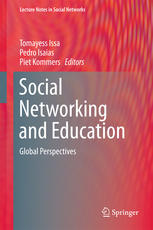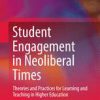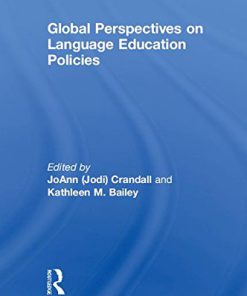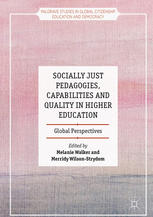Social Networking and Education Global Perspectives 1st Edition by Tomayess Issa, Pedro Isaias, Piet Kommers 3319177168 9783319177168
$50.00 Original price was: $50.00.$25.00Current price is: $25.00.
Social Networking and Education Global Perspectives 1st Edition by Tomayess Issa – Ebook PDF Instant Download/DeliveryISBN: 3319177168, 9783319177168
Full download Social Networking and Education Global Perspectives 1st Edition after payment.

Product details:
ISBN-10 : 3319177168
ISBN-13 : 9783319177168
Author: Tomayess Issa, Pedro Isaias, Piet Kommers
The present work is intended to assist academics, researchers and proponents of online learning and teaching. Academics will be able to share the findings presented in this book, and the Social Networking and Education Model (SNEM), with their students (i.e. Masters and PhD). It is envisaged that this book will assist researchers and anyone interested in online learning to understand the opportunities and risks associated with the use of Social Networking in the education sector, and assist them to implement SN by means of the new SNEM model. The reader will benefit from our examinations of the risks and opportunities associated with the use of Social Networking in the education sector in various regions around the world: Asia-Pacific, Europe, Mediterranean, America, Middle East and the Caribbean. In addition, a Social Networking and Education Model (SNEM) will be developed to promote and implement Social Networking in the education sector.
Social Networking and Education Global Perspectives 1st Table of contents:
Part ISocial Networking
1 Social Networking
Abstract
1 Introduction
2 The History of the Internet
3 Web Types
4 Social Networking Applications
4.1 Wiki
4.2 Blogs
4.3 Mashups
4.4 Tags
4.5 Podcasts
5 Social Networking and Education
6 Conclusion
References
Part IISocial Networking in Asia-Pacific
2 Social Networking in Australia: Opportunities and Risks
Abstract
1 Introduction
2 Social Networking
3 Research Method and Questions; Survey Design
4 Participants
5 Results, Discussion and New Significance
6 Conclusion
References
3 Students’ Perception Towards the Potential and Barriers of Social Network Sites in Higher Educatio
Abstract
1 Introduction
2 Social Network Sites Applications
2.1 The Advantages of Social Network Sites for the Students
2.2 The Disadvantages of Social Networks for the Students
3 Methodology
4 Results
4.1 The Advantages of Social Network Sites
4.2 The Disadvantages of Social Network Sites
5 Discussion
6 Conclusions and the Future Works
References
4 Effect of Social Networking on Higher Education in India
Abstract
1 Introduction
2 Social Networking Background
3 Research Method
4 Findings of the Survey
4.1 Gender Distribution of Surveyed People
4.2 Age Distribution of Surveyed People
4.3 Popular Fields of Study of Respondents
4.4 Educational Level and Internet Use
4.5 Social Networking Versus Emails in Terms of Time Spent on Internet Per Day
4.6 Time Spent on Email and Social Network Per Day
4.6.1 As a Function of Age
4.6.2 As a Function of Area of Study
4.7 Most Popular Uses of Social Networking and Internet
4.7.1 Diversified Common Uses of Social Networking and Internet
4.7.2 Internet and Social Networking Use Based on Age
4.8 Study Oriented Use of Social Networking and Internet
5 Effects of the Social Networking
6 Conclusion, Limitations and Future Work
References
5 Age and Gender Differences in Social Networking: Effects on South Korean Students in Higher Educat
Abstract
1 Introduction
2 Effects of Social Networking
3 Method
3.1 Participants and Data Collection
3.2 Instruments
3.3 Data Analysis
4 Results
4.1 Demographics of Participants
4.2 Factor Analysis and Reliabilities
4.3 Effects of SNS on Students in Higher Education in Korea
4.4 Age Differences in Social Networking Effects
4.5 Gender Differences in the Effects of Social Networking
5 Discussion
6 Conclusion
7 Limitations and Future Studies
References
6 The Advantages and Risks of Using Social Networking in Higher Education in Pakistan
Abstract
1 Introduction
1.1 Types of Web 2.0 Applications
1.1.1 Blogs
1.1.2 Wikis
1.1.3 Mashups
1.1.4 Social Network
1.1.5 Podcasts
1.1.6 Virtual Worlds
1.1.7 Web Syndication
1.1.8 Twitter
1.1.9 Social Search Engine
1.2 The Relationship Between Web 2.0 and Social Networking
1.3 Social Networking in Different Sectors
1.3.1 Industrial Sectors
1.3.2 Health Sector
1.3.3 Social Networking in Higher Education Sectors
1.4 Positive/Negative Impacts of Social Networking in the Higher Education Context
1.5 Research Methodology
1.6 Survey Research
1.7 Research Questions
1.7.1 Secondary Research Question
1.8 Results/Findings
1.8.1 Primary Question Findings
1.8.2 Secondary Question Findings
1.9 Discussion of Positive and Negative Findings
1.10 Limitation
1.10.1 Sample Size of Research
1.10.2 Time
1.10.3 Consideration of Web 2.0 Instruments/Scope
1.10.4 Consideration of References
1.10.5 Poor Responses From Participants
1.11 Conclusion
References
Part IIISocial Networking in Europe
7 Social Networking in Higher Education: Students in The Netherlands
Abstract
1 Introduction
2 Research Question
3 The Research Method
4 Patterns in Social Media Preferences Among Students in The Netherlands
5 Survey Coherence
6 Main Factors in the Perceived Benefits of Social Networking
7 Underlying Factors in Social Media
8 Discussion
9 Significance of This Chapter
10 Limitations and Future Research
11 Conclusion
References
8 Higher Education Students’ Perceptions of Positive and Negative Effects of Social Networking in Po
Abstract
1 Introduction
2 Social Networks in Portugal
2.1 Social Networks and Higher Education
3 Methods
3.1 Participants
3.2 Data Collection Instrument
4 Results
4.1 Descriptive Statistics
4.2 Factor Analysis
5 Discussion
6 Conclusion
References
9 An Examination of Greek College Students’ Perceptions of Positive and Negative Effects of Social N
Abstract
1 Introduction
2 Research on Social Networking
3 Methods
3.1 Research Questions
3.2 Participants
3.3 Data Collection Instrument
3.4 Procedure
4 Results
4.1 Factor Analyses
4.2 Descriptive and Correlational Analyses
4.3 Gender and Age Differences
5 Discussion
6 Implications and Conclusions
References
10 Effects of Social Networking on Learning: The Opinions of Italian University Students
Abstract
1 Introduction
2 Use of Social Media: The Current Landscape
3 Research Method, Data Collection and Sampling Technique
4 Data Analysis and Results
4.1 Sample Features
5 Positive and Negative Aspects of Social Networking
5.1 Positive Aspects
5.2 Negative Aspects
5.3 Factor Analysis of Positive and Negative Aspects of Social Networking
6 Discussion
7 Conclusions
References
Part IVMediterranean, Turkey
11 Social Networking in Higher Education in Turkey: Students’ Use and Perceptions
Abstract
1 Introduction
1.1 Growth of Social Networking
1.2 Current Uses of Social Networking Sites Among Young People
1.3 Why Youth Use Social Networking Sites
1.4 Study Purpose and Research Questions
2 Methodology
2.1 Study Procedure and the Instrument
2.2 Data Analysis
3 Key Findings
3.1 Background Information of the Participants
3.2 Factor Analysis
3.3 Positive Effects of Using the SNSs
3.3.1 Gaining Knowledge
3.3.2 Communication
3.3.3 Acquiring Acquaintances
3.3.4 Being Environment-Friendly
3.4 Negative Effects of Using the SNSs
3.4.1 Physical Effects
3.4.2 Cognitive Effects
3.4.3 Security
3.4.4 Social Effects
3.4.5 Emotional Effects
3.5 Gender Differences on Students’ SNSs Use
4 Conclusions
References
12 Effects of Social Media on Students: An Evaluation Approach in Turkey
Abstract
1 Introduction
2 What is Social Media?
2.1 Advantages and Disadvantages of Social Media
3 Today’s Popular Social Media Services
4 Evaluating Effects of Social Media on Students
4.1 Evaluation—Research Method
4.2 Research Questions
4.3 Evaluation—Research Tool
4.4 Information About Participants
5 Findings Obtained via Evaluation Approach
5.1 Findings Obtained for Evaluating Positive Effects of Social Media
5.2 Findings Obtained for Evaluating Negative Effects of Social Media
6 Discussion
6.1 Positive Effects of Social Media
6.2 Negative Effects of Social Media
6.3 Limitations and Future Work
7 Conclusions
References
13 Social Network Usage
Abstract
1 Introduction
1.1 Purpose
2 Method
2.1 Study Group
2.2 Materials
3 Results
3.1 Descriptive Statistics of Internet Usage of Participants
3.2 Results on Use of Social Network in a Positive Way
3.3 Results on Negative Effects of Social Networking
4 Conclusion
4.1 Limitations and Future Research
References
Part VSocial Networking in North America
14 College Students’ Perceptions of Positive and Negative Effects of Social Networking
Abstract
1 Introduction
2 Research on Social Networking
3 Methods
3.1 Research Questions
3.2 Participants
3.3 Data Collection Instrument
3.4 Procedure
4 Results
4.1 Factor Analyses
4.2 Descriptive and Correlational Analyses
4.3 Gender and Age Differences
5 Discussion
6 Implications, Limitations, and Future Directions
References
15 How American Students Perceive Social Networking Sites: An Application of Uses and Gratifications
Abstract
1 Introduction
2 Theoretical Framework and Background on Social Networking
2.1 Uses and Gratifications Theory
2.2 Social Networking and Online Communities
3 Research Questions
4 Method
4.1 Survey Sample and Procedure
4.2 Survey Design
4.3 Survey Analysis
5 Results
5.1 RQ1: What Is the Overall Social Networking Site Usage Among US College-Aged Students?
5.2 RQ2: What Are the Positive Uses and Gratifications of Social Networking Sites for US College-Age
5.2.1 Keeping in Touch with Others
5.2.2 Help with Work
5.2.3 Improving General Knowledge
5.3 RQ3: What Are the Negative Uses and Gratifications of Social Networking Sites for US College-Age
5.3.1 Increasing Distractions
5.3.2 Concern for Privacy
5.3.3 Negative Interpersonal Ramifications
6 Discussion
7 Limitations and Future Research
8 Conclusion
References
Part VISocial Networking in Mexico
16 Impact of Social Networks in Mexican Universities
Abstract
1 Introduction
1.1 Social Networks in Latin-America and M00E9xico
1.2 Social Networks in Mexican Universities
1.3 Study Purpose and Research Questions
2 Method
2.1 Participants
2.2 Measures
2.3 Procedure
3 Results
3.1 Descriptive Statistics
3.2 Time Spent on the Social Networking and Email Daily
3.3 Positive Effects of Using the Social Networking
3.3.1 Perceived Positive Effects of Social Networking Site Use
3.4 Negative Effects of Using the Social Networking
4 Discussion
4.1 Comments on the Positive Effects of Using the Social Networking
4.2 The Analysis of Negative Effects from Four Perspectives
Part VIISocial Networking in Middle East
17 Social Networking Effects on Jordanian Students
Abstract
1 Introduction
2 Related Works
3 The Development of ICT in Jordan
4 Research Methodologies
4.1 Survey Layout and Research Questions
5 Properties of the Study Sample
6 Positive and Negative Effects of Social Networking
6.1 Positive Effects of Social Networking
6.2 Negative Effects of Social Networking
6.2.1 Cognitive Development
6.2.2 Social Development
6.2.3 Physical Development
6.2.4 Security
6.3 Factor Analysis
6.4 Sustainability Awareness and Professional Attitude
6.5 Discussion and Significance Contribution from This Study: Theoretical and Practical
7 Conclusions and Future Research
References
18 Effects of Social Networking on Higher Education in Saudi Arabia
Abstract
1 Introduction
2 Literature Review
3 Methodology
4 Data Analysis
4.1 Positive Effects
4.2 Negative Effects
5 Discussion of Findings
6 Conclusion
References
Part VIIISocial Networking in Caribbean
19 Social Networking by Undergraduate Students at the University of Puerto Rico in Carolina
Abstract
1 Introduction
2 Use of Social Networks
3 Methods
4 Participants
5 Results
6 Discussion
7 Limitations
8 Future Research
9 Conclusions
References
Part IXSocial Networking andEducation Model (SNEM)
20 Social Networking and Education Model (SNEM)
Abstract
1 Introduction
2 Social Networking Opportunities and Risks
3 Results and Discussion
4 Social Networking and Education Model (SNEM)
5 Conclusion
People also search for Social Networking and Education Global Perspectives 1st:
podcasting and using social networking sites in education
advantages and disadvantages of social networking in education
describe the role of internet in education and social networking
social mobilization and networking in education
social networking media and education
Tags: Social Networking, Education Global, Perspectives, Tomayess Issa, Pedro Isaias, Piet Kommers
You may also like…
Education Studies & Teaching - School Education & Teaching
Global Perspectives on Language Education Policies 1st Edition Joann (Jodi) Crandall
Education Studies & Teaching
Politics & Philosophy - Anthropology
Business & Economics
Politics & Philosophy
Education Studies & Teaching - School Education & Teaching
Teacher Education in the Global Era Perspectives and Practices Karanam Pushpanadham
Education Studies & Teaching - School Education & Teaching
Politics & Philosophy - Social Sciences
Global Citizenship Education Critical and International Perspectives Abdeljalil Akkari












